Types of teeth stains: Intrinsic and extrinsic stains are the 2 basic forms of tooth stains. Endogenous stains are created within the teeth by antibiotics, trauma, or heredity. Smoking, coffee, alcohol, yogurt, and fizzy beverages induce exogenous tooth stains.
Let’s find out with dentist Bassendean in this article!
Types Of Teeth Stains & Causes
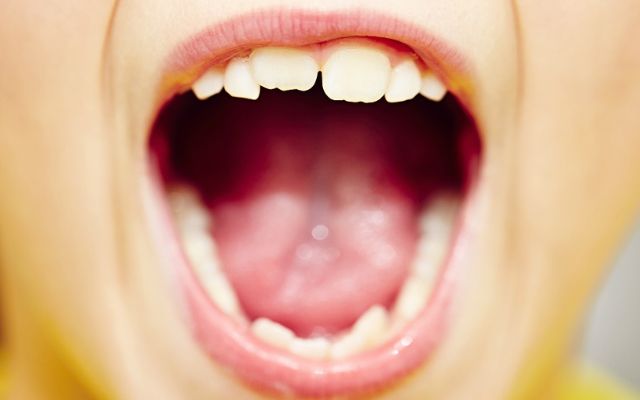

Many people would do everything to have pearly white teeth like those naturally seen in nature. A variety of oral health problems, including tobacco use, may discolor teeth over time. Knowing tooth discolouration types helps diagnose and treat it.
Dentist Bassendean will outline the most common types of tooth discolouration and their causes:
Intrinsic Stains
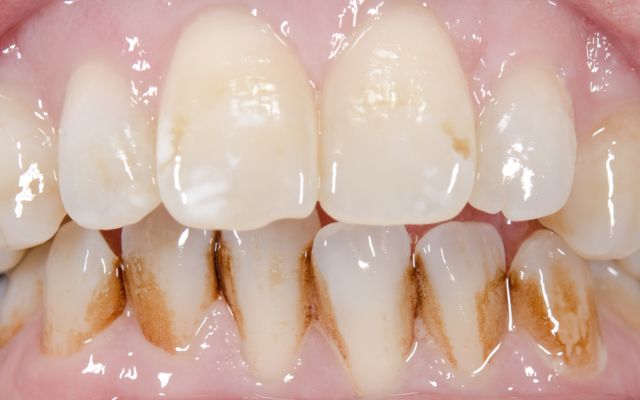

Intrinsic tooth discoloration is a condition in which teeth are discolored due to endogenous factors such as:
- Genetics.
- Tooth diseases include dental decay, gingivitis, and inflammation of the tooth roots may also lead to discoloration of the teeth.
- Drugs like tetracycline and doxycycline may discolor teeth. Pregnant women and toddlers less than 7 to 8 years old may have tooth discoloration and yellowing from these antibiotics.
- Contaminated with fluoride: This is a chemical that is routinely added to toothpaste and tap water, but too much fluoride may cause tooth discoloration and enamel defects in pregnant women and children.
This is a fairly common problem in dentistry and can cause low self-esteem, affecting your smile and oral health. Dentists examine the jawbone, soft tissues, plaque, and teeth to detect and correct intrinsic discoloration. We’ll suggest the patient change their diet or stop using medications, colorants, or unhealthy foods to lessen intrinsic tooth discolouration.
In general, several treatments are available for intrinsic tooth discoloration. So, people afflicted should see the dentist for an assessment and advice.
Extrinsic Stains
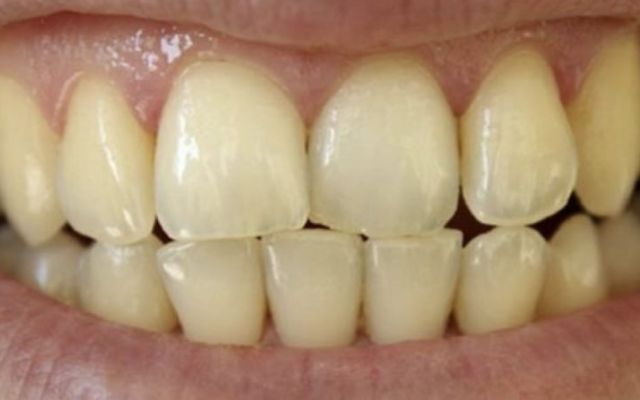

Extrinsic tooth discoloration may result from drinking drinks with plenty of colorants, such as:
- Coffee, red wine, carbonated soft drinks.
- Tobacco, or the use of certain foods with these substances.
- Moreover, poor oral hygiene, poor after-meal cleanliness, and poor toothpaste usage may all contribute to extrinsic tooth contusion.
Enamel hypoplasia
Enamel hypoplasia is a tooth discoloration caused by enamel loss, poor diet, or poor dental hygiene. Hypoplastic enamel often appears on the chewing surfaces of back teeth and may be any shade of brown, black, or white.
The reason for enamel hypoplasia is often enamel wear. Loss of enamel compromises the tooth’s defenses, thus it’s important to take care of your teeth.
Also, too much coffee, alcohol, or carbonated soft beverages may erode tooth enamel, as does a poor diet. Poor dental hygiene leads to enamel loss and pore stains.
Are Discolored Teeth Dangerous?
Not only can tooth discoloration impact one’s self-esteem, but it may also mask dental health issues. According to research by Gül et al (2020), discolored teeth can affect the patient’s quality of life and psychological health.
- For instance, teeth discoloration may indicate tooth decay, improper care, or injury. These issues might progress to the point of tooth loss without fast and proper treatment. As a result, tooth discoloration is a serious issue that requires medical attention.
- Besides, discolored teeth can also be caused by bad habits such as smoking, and drinking coffee, tea, soft drinks, and other beverages. Controlling these habits can help prevent plaque buildup on your teeth and limit risks to your oral health.
- Moreover, liver illness, renal disease, blood disease, or stomach disease may all be indicated by tooth discoloration. So, patients with stained teeth should see a doctor to determine the cause and get prompt treatment.
In summary, discolored teeth can potentially pose oral health problems and can affect aesthetics, so they should not be taken lightly and should be properly examined and treated. Controlling bad habits can help limit risks to oral health.
Spring Orchid Dental Clinic’s Tooth Stain Treatment
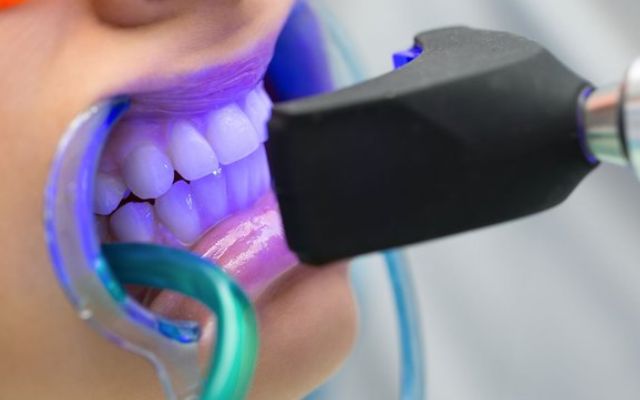

Everyone desires a dazzling, white smile, yet many individuals have tooth stains. Food residues, cigarettes, weak teeth, and poor dental care may cause stains. This makes individuals less secure in conversing and uncomfortable with their teeth. Spring Orchid Dental understands patient psychology in this situation. We employ cutting-edge techniques to safely and effectively remove tooth stains.
So, we provide our patients with healthy teeth and smiling confidence:
Treating Intrinsic Stains On Teeth
Intrinsic stains on teeth are a common problem in dentistry. However, treating intrinsic stains on teeth is a big challenge for dentists. At Spring Orchid Dental, we offer the following treatments for intrinsic stains on teeth:
- Composite filling: To cure inherent tooth discoloration, composite fillings are often employed. This procedure uses composite materials to cover the discolored tooth. The composite is polished and hardened using UV light.
- Cosmetic porcelain teeth: Internal stains on teeth may be removed using porcelain veneers, a common cosmetic procedure. While using this technique, a new tooth surface is fabricated from porcelain. Porcelain crowns may be made to seem just like your natural tooth in terms of size, shape, and shade.
- Teeth Whitening: A quick and painless way to remove inherent stains from teeth is via teeth whitening. Stains are removed utilizing bleaching treatments like tooth whitening gels or lasers.
Short, Spring Orchid Dental’s expert dentists conduct the aforementioned procedures for attractive, healthy smiles.
Extrinsic Stain Treatment
Stains on teeth created by things outside the mouth, such as food dyes, drinks, cigarettes, and cigarette smoke, are called extrinsic stains. Spring Orchid provides efficient tooth whitening options, such as:
- Laser teeth whitening: In order to eliminate stains from teeth, lasers are used to activate whitening chemicals.
- Gel teeth whitening: With this procedure, a whitening gel is applied to the teeth, and then light is used to bleach them.
At-home teeth whitening: This method uses dental molds available at the dentist, along with whitening gel, to help remove stains from teeth at home.
Conclude
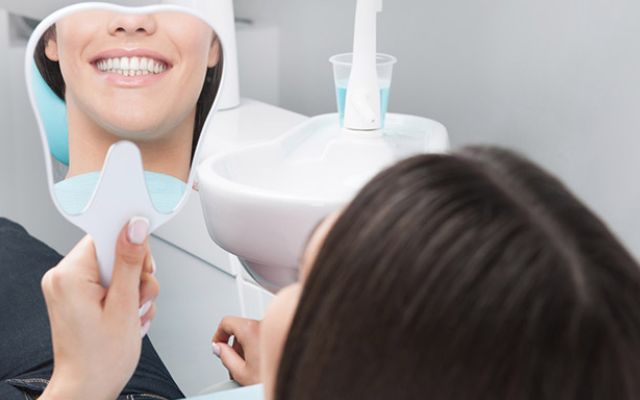

Here at Spring Orchid Dental, we provide teeth whitening and regular dental checkups to help you maintain a bright, healthy smile. We value your smile and dental health because we know how important they are to you.
- Our team of dentists includes general, cosmetic, and preventative care specialists including Drs. Sara Nguyen and Millicent Taylor. To help you achieve a gleaming, self-assured grin, we’re providing cutting-edge, risk-free procedures.
- In addition, we provide dental education resources to assist you to learn more about oral health and take preventative measures to safeguard your teeth and gums. We promise to put your needs first every time you visit, so you can come in with complete trust and confidence.
In conclusion, come to us at 6/85 Walter Rd E Bassendean WA 6054 if you want a beautiful and healthy smile.
FAQs
Do Stains On Teeth Go Away On Their Own?
Tooth stains may fade on their own. Surface stains from coffee, tea, alcohol, or smoke may fade with time.
Nonetheless, intrinsic or recurrent stains may persist. Only tooth whitening or dental procedures may eradicate them. Patients should see their dentist often to monitor their oral health and address dental issues to achieve the greatest outcomes and brighter teeth.
Can I Prevent Stains On My Teeth?
Yes, you can keep your teeth from getting stained by taking good care of them. This involves brushing twice a day, flossing between teeth, and minimizing sugary liquids including coffee, tea, red wine, and water. Regular dental appointments and skilled cleanings may remove deposits and stains from your teeth.
Also, ask your dentist about stain prevention.
Does Brushing More Crase Dental Stains?
Basically, maintaining healthy teeth requires regular brushing. Unfortunately, further brushing may not entirely eliminate tooth discoloration. Teeth get discolored via exposure to plaque, microorganisms in plaque, and food and drink dyes.
So, excellent oral hygiene—brushing twice a day for 2 minutes, flossing, and frequent dental visits to eliminate plaque and stains—prevents tooth discoloration.





